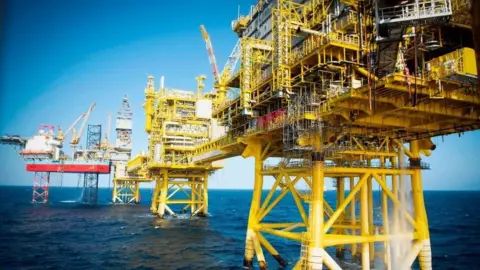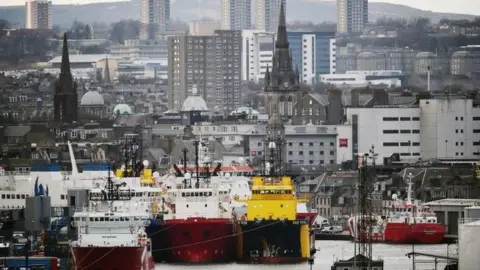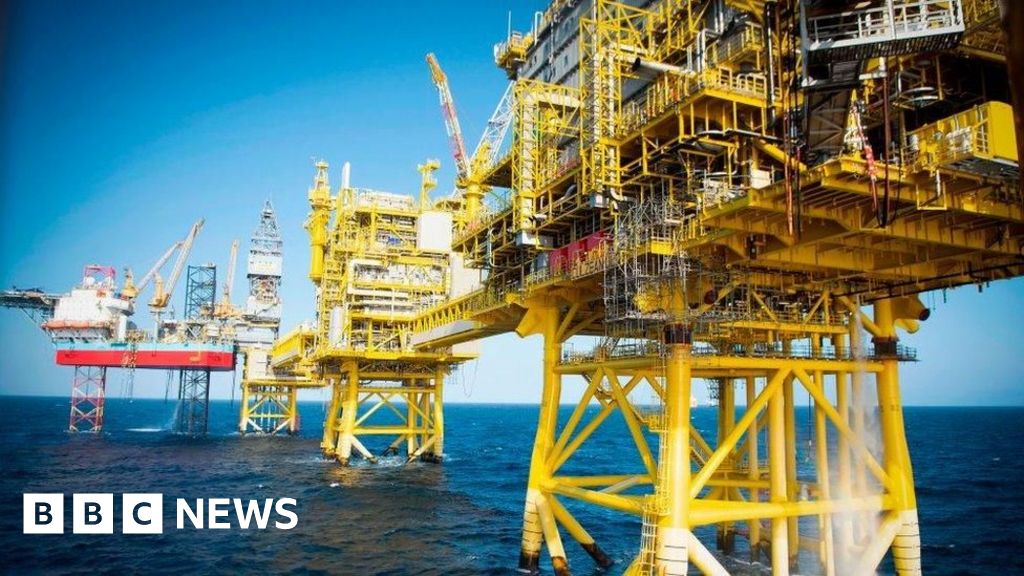Kevin KeaneScotland environment, energy and rural affairs correspondent
 Getty Images
Getty ImagesIt’s being viewed as a make or break moment for Europe’s energy capital – as Aberdeen waits to see whether the chancellor will scrap the windfall tax.
The industry says the tax, which was introduced when Russia’s invasion of Ukraine caused oil prices to spike sharply, is crippling the sector.
The oil price has since halved, to about $60 a barrel, and companies say there are no profits to be made under such a high tax regime so are taking their cash to other parts of the world.
Investment in the North Sea is at a record low and a study from Robert Gordon University says jobs are being “quietly” lost at a rate of 1,000 a month.
Whoever you speak to in the north-east, from oil executives to taxi drivers and hairdressers, they know a surprising amount about this unusual corporation tax.
Formally known as the Energy Profits Levy, it means that operators are handing over 78% of their profits to the Treasury.
The rate is one of the highest in the world and, though the headline figure is matched by Norway, our North Sea neighbour has much more favourable tax reliefs.
It’s a difficult dance for political parties, many of whom have prioritised tackling the climate crisis which is driven by greenhouse gas emissions from burning fossil fuels.
What are the Scottish and UK governments saying?
The simple argument is that more oil and gas production from the North Sea equals more emissions, but it’s actually much more nuanced than that.
The Climate Change Committee has made it clear that our economy will need hydrocarbons in ever-diminishing quantities for decades to come and replacing domestic production with imports makes no sense.
In fact, emissions from producing a barrel of North Sea crude are much lower than many Middle Eastern oil fields, and shipping it halfway across the world burns even more fuel.
That’s part of the reason why the Scottish SNP government has stepped away from its “presumption against” new oil and gas, saying instead that each application must be made on its merit.
The UK Labour government appears to be giving some ground too as it’s reported that a review of the future of the North Sea will allow small “tiebacks” where existing oil and gas fields stray into currently-unlicenced areas.
In theory, that would help prolong the future of the North Sea, with some green groups even suggesting that it’s a reasonable compromise.
 Getty Images
Getty ImagesThe main concern for environmentalists is that the UK doesn’t allow any more Rosebank-scale oil fields, which is so big it requires entirely new infrastructure.
But for the industry, this offer on tiebacks would be seen as meaningless, throwing a few crumbs of comfort while entirely avoiding the biggest deterrent to investment.
One urged me not to be “hoodwinked” into believing that tiebacks were the answer to the North Sea’s woes.
If the headline tax rate remains at 78%, companies would simply keep their cash off the table, whether the investment would be in new discoveries or small extensions through tiebacks.
And that’s where the comparisons with the closure of the coal fields come in – an energy policy which destroyed communities.
In this case, many of the jobs that are going are highly-skilled roles such as engineers and geologists.
Those people aren’t going to be on the dole as their craft is in high demand in other parts of the world.
Many of us in the north-east already have neighbours who work overseas or who have moved their entire families with them. Some have retired early.
Those who want to work are not going to be joining the dole queue, but the hairdressers, taxi drivers, waiting staff and shopkeepers left behind will find life increasingly difficult with less money being spent by the people who have moved away.
And the industry has long pointed out that those same engineers are the ones we need to retain in the UK to help build the green energy industry of the future.

